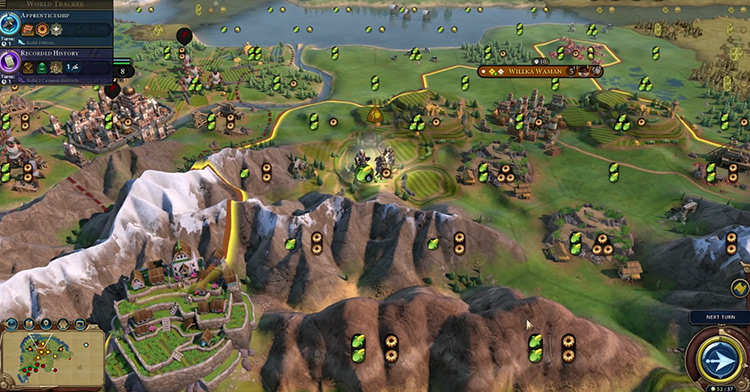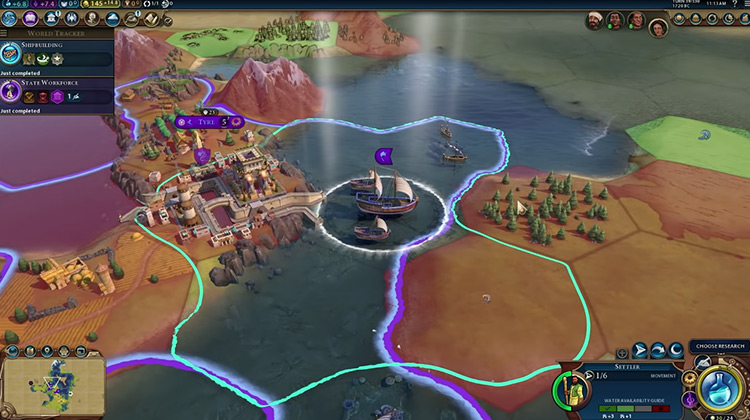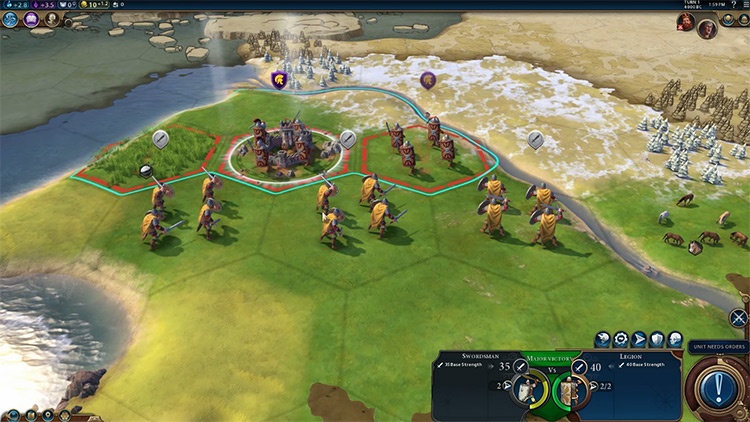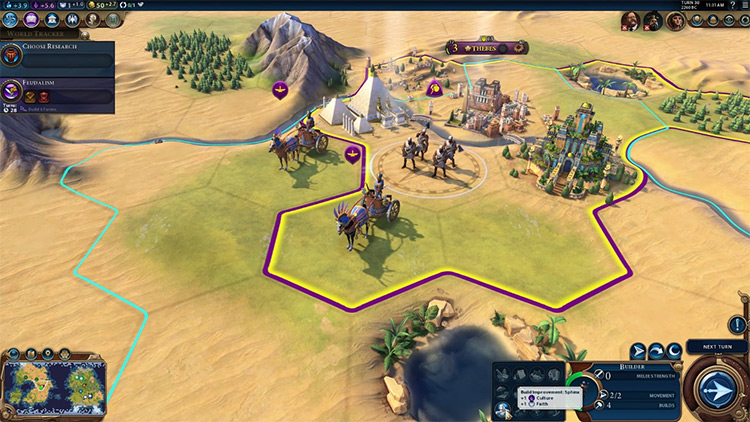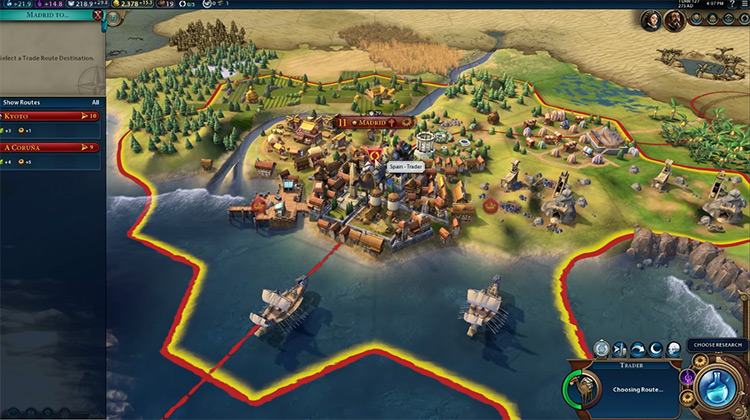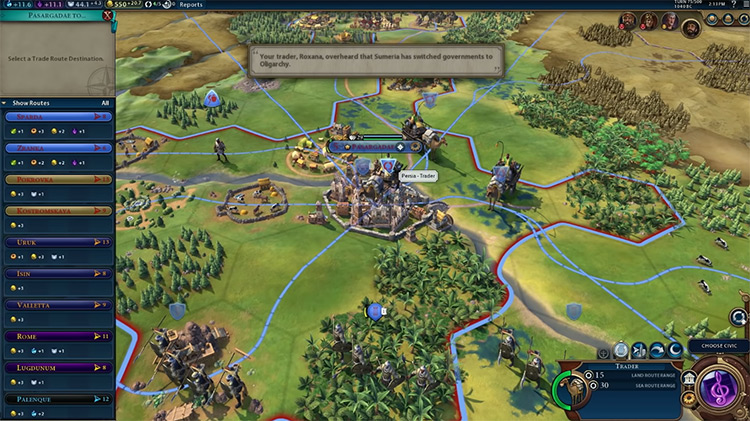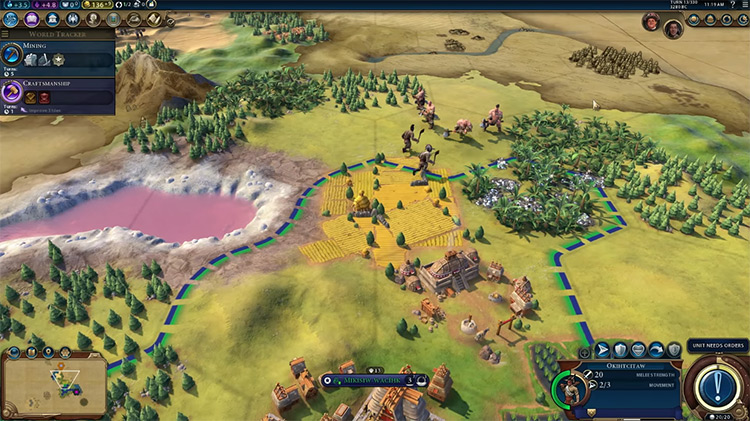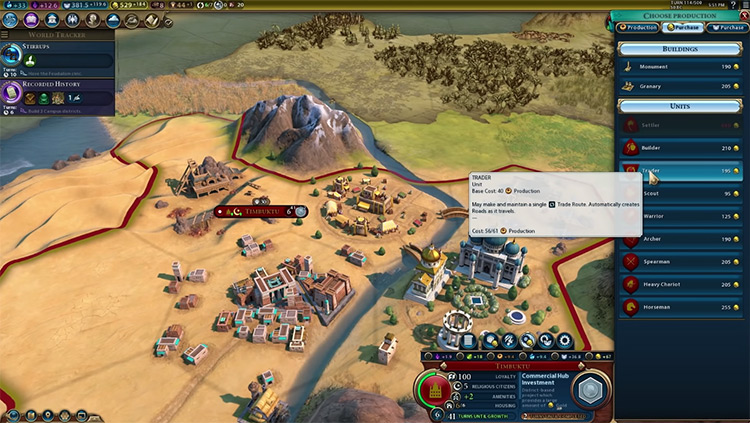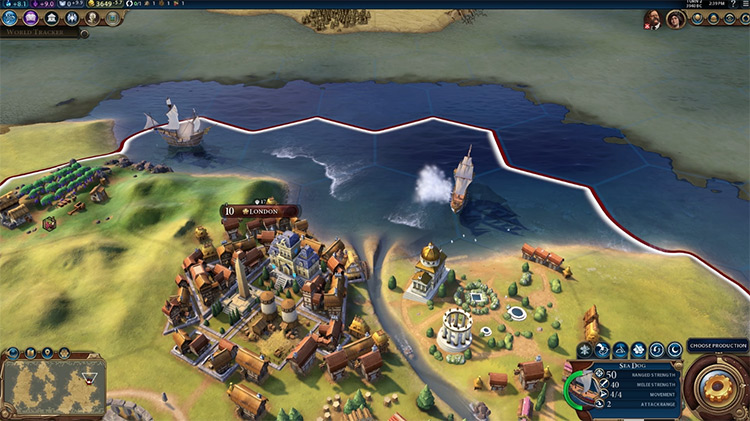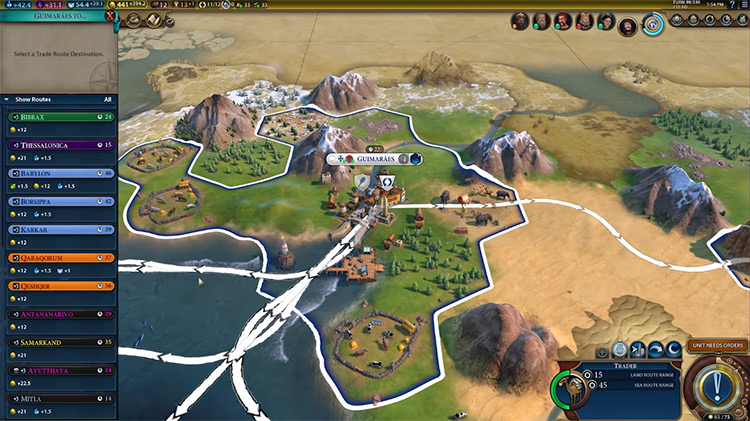And correctly managing your trade routes is one of the most powerful tools you have to rake in the coin. Whether international or domestic, trade routes are an empire’s circulatory system in Civ 6. They pump gold, food, and other resources to cities far and wide across your empire. Just as some cities are naturally suited to military domination or scientific development, others shine for their profitable traders. Let’s find out which societies are the best at commerce!
10. Pachacuti’s Inca
The Inca built a massive empire on the back of farmers and traders that transported goods across the Andes mountains and allowed large urban centers to flourish. We can see this reflected in Civ 6 with the Inca’s ability to work mountain tiles and the food bonus their domestic trade routes get from each mountain tile in the starting city. After researching Foreign Trade, the Inca can construct the Qhapaq Ñan, which allows their trade routes (and other units) to cross mountain ranges – adding some extra gold to their cargo. If you want to play an isolationist trade-based civ, you can’t go wrong with the Inca.
9. Dido’s Phoenicia
Dido’s Phoenicia thrives by settling coastal cities and building their unique Cothon district, which replaces the Harbor and gives you a massive production boost for Settlers and naval units. The more Cothons, the easier it is to settle more cities – allowing you to extend your trading range far and wide. You don’t need to worry about loyalty as long as your cities are coastal, contributing to your naval dominion. What makes Phoenicia a great trade civ is that they get extra trade routes for constructing the Government Plaza and buildings for that district, for a total of four extra trade route slots. Did I mention sea lane trade routes are available from the moment you start constructing the Cothon, without having to finish it? It’s too good!
8. Trajan’s Roman Empire
The Roman Empire is among the game’s most potent, consistent, and easy-to-use civs. Trajan can easily dominate a match with foreign or domestic trade thanks to the All Roads Lead to Rome ability, which grants every new city a free trading post and a road connecting to the capital. You’ll get an extra gold piece per turn for every trading post your trader passes on their route, meaning you’ll get richer with every city you connect to the network. Just keep expanding and the money will keep flowing in.
7. Cleopatra’s Egypt
If you’re the kind of player who prefers to work together with their neighbors rather than conquering them by force, Cleopatra’s Egypt is an excellent choice. Egypt is primarily a wonder-focused civilization, with skills that allow them to build districts and wonders faster on river banks and make their constructions immune to flood damage. That said, their trade game is also top-notch. Their international trade routes give them a massive +4 gold bonus, and any foreign routes going into your territory grant you an additional 2 gold.
6. Phillip II’s Spain
Seafaring civilizations are uniquely well-suited for trade. Spain is no exception. Phillip II’s entire strategy revolves around building a strong military to protect his investments on the high seas. You’ll be able to create a massive fortune thanks to the extra 3 gold, 2 faith, and 1 production you’ll get from trade routes – and trans-continental routes get triple these yields, which is absolutely insane. This makes your maritime trade routes a big target for foreign powers. The way you counter this – while also becoming even richer – is by rushing the Mercantilism civic. Where other civs unlock fleets and armadas with Nationalism and Mobilization, you do so in one fell swoop with Mercantilism. You’ll likely be the first to get them, ensuring your oceanic dominion.
5. Cyrus’s Persia
Some people wake up in the morning and choose violence. If you fall into that category, Persia is the civ for you. Cyrus specializes in steady military expansion by surprising Persia’s neighbors and taking their cities in just a few turns. Their units get a +2 movement per turn bonus after declaring a surprise war, making it easy to move everyone into position. Usually, being a warmonger like this would cripple your trade game – but Persia’s domestic trade routes provide +2 gold and +1 culture, helping you develop without help from outside. In addition, Persia’s roads start at one more level than usual, so your trade routes move faster.
4. Poundmaker’s Cree
Most people tend to sleep on Poundmaker – but when we’re looking at it from a trade perspective, the Cree get their chance to shine. Poundmaker, also known as Pîhtokahanapiwiyin, can leverage trade routes for an incredible early game that can help the Cree snowball like few other civs can. Cree trade routes grant +1 food to the origin city and +1 gold to the destination for every Camp or Pasture in this urban center. Moreover, they get an extra trade route and a free trader the moment they develop Pottery – so you can start getting the most of these bonuses immediately. What’s truly unique about Cree traders is that they culture bomb any tile they pass through, as long as this unclaimed land is close to a Cree city.
3. Mansa Musa’s Mali
When it comes to making gold in general, Mansa Musa’s Mali has no equal – and trading is a vital part of their strategy. Mali’s international trade routes gain extra gold for every flat desert tile in the sending city. In addition, Mali unlocks a new, permanent trade route every time they enter a Golden Age. This is especially good considering how much Mali can profit from desert cities. Desert tiles grant City Centers extra food and faith adjacency bonuses, making them much more viable. If you manage to get Petra in one of your desert cities, you’ve basically won the game.
2. Queen Victoria’s England
If you want to supercharge your trading game to the point where your computer has trouble processing your trade routes, try out England on an oceanic map. Every city founded by Queen Victoria on a continent different from where she started will grant you a new trade route. If you play your cards correctly, you’ll have more than double the trade routes you’d usually get. As a coastal civ, you’ll always want to build the Royal Navy Dockyard – which replaces the Harbor for England. This guarantees you’ll get a second trade route slot early in every city’s life. Building an RND also grants the player a free naval unit – usually a Sea Dog – which should help keep your trade routes safe and establish naval superiority at a lower cost.
1. João III’s Portugal
Like England, Portugal is all about building and trading with coastal cities. This unique civilization is entirely dependent on the ocean regarding trade, as they can only send traders to cities founded on the coast or with a Harbor district. In exchange, they get a 50% boost to every yield from trade routes, and their traders can reach 50% farther than other civilizations. Meeting other civilizations will also grant you a new trade route slot each time so you can start profiting from their coastal cities ASAP. In a way, João III is Queen Victoria’s hard counter because of this. Portugal can be a mediocre civ in many regards – but they’re top of the line when it comes to trade.
